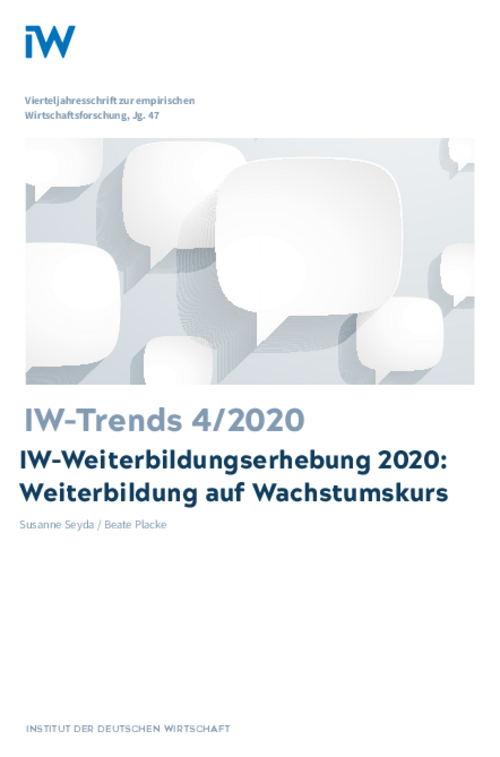The latest IW Survey of Further Training shows that 87.9 per cent of companies in Germany offer their employees continuing vocational training. In 2019, an average of 18.3 hours per employee was spent acquiring additional skills in this way, a full hour more than in 2016.

Continuing Vocational Training Goes on Growing: Results of the IW Survey of Further Training 2020
IW-Trends

The latest IW Survey of Further Training shows that 87.9 per cent of companies in Germany offer their employees continuing vocational training. In 2019, an average of 18.3 hours per employee was spent acquiring additional skills in this way, a full hour more than in 2016.
Currently, companies are investing 1,236 euros per worker in further training. This is almost 16 per cent more than in 2016 and represents an investment volume over the whole economy of some 41.3 billion euros. As was already apparent in 2016, digitalisation is a major driver of continuing vocational training and digitalised companies invest more time and money in it than other firms. At 89.2 per cent, most further training takes place during paid working hours. Just under three-quarters of the companies surveyed consider it appropriate to share the cost of such measures between companies and employees, as currently happens. However, around 70 per cent of firms are in favour of state support to supplement their own strong commitment – especially to assist the low-skilled, older workers and small and medium-sized enterprises, and to help companies cope with the structural changes brought about by digitalisation. To this end, it would be useful to examine how the tax treatment of training costs could be changed. It would certainly seem sensible both to assist companies in identifying their training needs and to lower the barriers to further training by offering more information and advice, and thus motivating even greater numbers to sign up.

Susanne Seyda / Beate Placke: Weiterbildung auf Wachstumskurs
IW-Trends

More on the topic

Data Utilisation and Data Sharing: The Potential and the Reality in German Companies
Companies that store their data extensively in digital form, process it in a structured manner and use it in a variety of ways can become particularly efficient members of the data economy.
IW
Intellectual property and fourth industrial revolution technologies: how the patent system is shaping the future in the data-driven economy
Using the classification system from the European Patent Office (EPO), we identify almost 600,000 patent applications for fourth industrial revolution technologies from 1986 to 2015.
IW